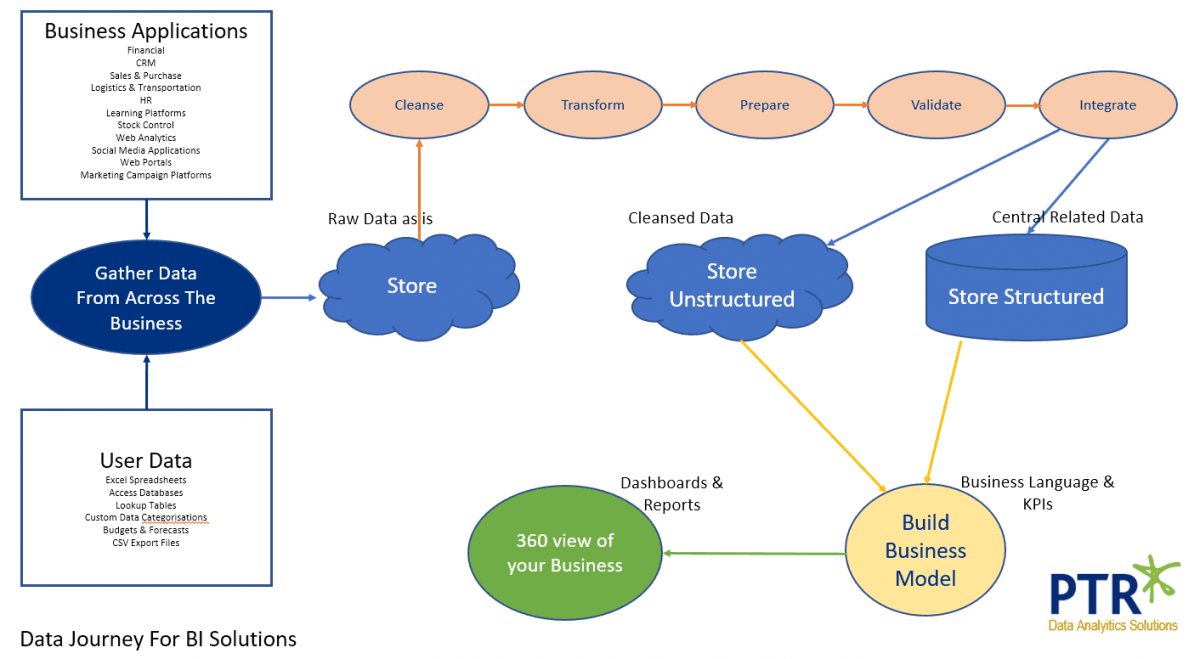Data Gathering, Preparation & Integration In Power BI Consultancy Services
The list of data sources that the many businesses and organisations we have worked with is endless and we have encountered most data challenges along the way. Here are a few for starters
The list of data sources that the many businesses and organisations we have worked with is endless and we have encountered most data challenges along the way. Here are a few for starters

Data Gathering, Preparation & Integration In Power BI
We work with clients pulling data from a myriad of data sources such as Sales, Supply Chain, Logistics, Financial, CRM and Audit systems to name but a few. The list of data sources that the many businesses and organisations we have worked with is endless and we have encountered most data challenges along the way. Here are a few for starters:
Connectivity issues
Disparate data sets that need to be integrated
Poorly structured data
Unstructured data
Poor quality data
Vast volumes of data that need to be shifted
Multiple definitions for business terminology
Legacy systems with non-standard APIs
Security and Data Governance restrictions
The gathering, preparation and integration of your data is an incredibly complex stage of your Power BI project, but vital if quality, trustworthy and consistent data is to be made available to your Power BI dashboard authors. It is the start of your data journey:

You can find out more about the complete data journey for a successful Power BI solution here.
Using PowerQuery in Power BI
Power BI caters for data cleansing, shaping and transforming through PowerQuery so in many cases it is not essential or necessary to implement more complex corporate ETL and ELT platforms, such as SSIS and Data Factory to handle this stage. That said you should carefully consider all options before deciding where is most appropriate to carry out this stage of your data journey. It is always beneficial to take stock of your entire data estate and build a robust and future proof data strategy before commencing on a Power BI implementation.
Gathering & Preparing Your Data - Where do you start?
Start by contacting PTR and we can take you through your options for preparing your data and where best it would be to carry these tasks out. We can assess your requirements and put together a per day or project based consultancy proposal to get you to where you need to be. It is vital that you see an early return on investment without committing to an extremely high budget and the best way to do that is to let us work with you to break your requirements down into manageable and affordable stages. Our Power BI consultants can help to turn your goals into actions.
We are a big fan of Proof of Concepts (PoC) where we will work with you to choose an initial business process and Business intelligence requirement that can be used to test the water and gain stakeholder confidence. A POC can help you to:
Prove a chosen data platform architecture as fit for purpose
Educate and equip your team with the new skills they will need going forward
Carry out sizing and capacity planning to assess the full cost and budget implications
Provide a relatively quick set of results to demonstrate the potential Return on Investment and benefits of a your Power BI solution
Following a successful PoC the full business intelligence and Power BI roadmap can be planned. By looking at the long term goals we can pull out the key business processes that need to be brought in to the Power BI solution, and in line with your data strategy can build the roadmap and timeline to start the journey.
It will be a journey, and the direction may from time to time change direction as business priorities change, but with a strong data Strategy and a well thought out roadmap these priority changes can easily be accommodated.
Share This Post
Frequently Asked Questions
Couldn’t find the answer you were looking for? Feel free to reach out to us! Our team of experts is here to help.
Contact Us